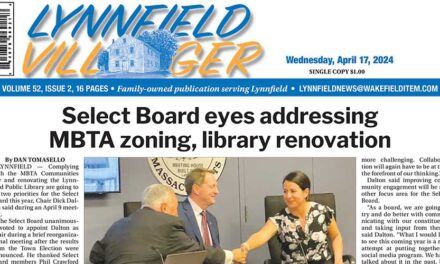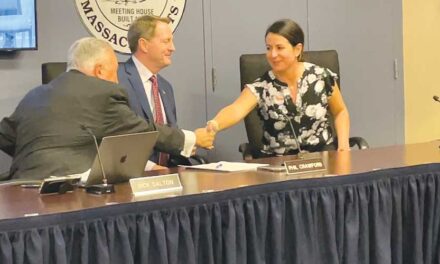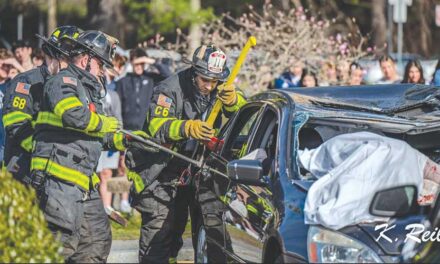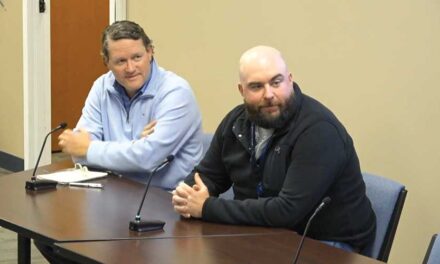By MARK SARDELLA
LYNNFIELD — A Regional Summit meeting on May 5 was a first in a number of respects.
It may have been the first time officials from Lynnfield and five nearby communities have met in a formal setting to share ideas. Plus, with the unique circumstances imposed by the COVID-19 shutdown, the meeting had to take place in the virtual setting of a Zoom teleconference.
In addition to Lynnfield, the summit featured officials from Wakefield, Melrose, Reading, Stoneham and Saugus.
The meeting was conceived and initiated by Wakefield Town Council Chairman Edward Dombroski, who also presided over the proceedings. Originally conceived as an in-person meet-up with a wide-ranging agenda, the COVID-19 shutdown and its ramifications became the inevitable focus of much of the summit meeting.
The first item on the agenda was a discussion of how, in light of the shutdown, various communities are handling open space use and safety for things like sports leagues, summer camps, restaurants and retail businesses.
Lynnfield Board of Selectmen Chairman Phil Crawford led off the discussion, noting that despite a lot of requests to start opening things up, the town is abiding by the governor’s order and has closed most town facilities, including courts, fields and parks. He said that the local Little League would like to play some kind of season, even if it’s later in the summer.
Anne Landry, vice chairwoman of the Reading Select Board, said that Reading had a public face mask order in place a few days before the governor’s order. She said that while all public athletic facilities are closed, Reading’s town forest and conservation land remains open.
Wakefield Town Administrator Stephen P. Maio said that he has been hearing from sports groups eager to get on the field. With regard to the governor’s face mask order that went into effect last week, Maio said it would be interesting to see how that is enforced. Maio said that under normal circumstances, registrations for summer camps and recreation programs would be taking place now.
Stoneham Town Administrator Dennis Sheehan observed that many parents were watching for when daycare facilities will be cleared to open. Raymie Parker, vice chairwoman of the Stoneham Select Board, said that her impression was that at this point parents are still leery about sending kids to participate in sports programs.
Mark Dockser, chairman of the Reading Select Board, predicted a flood of activity once recreation programs are cleared to open and recommended as much advance planning and preparation as possible to make things smoother when the time comes.
Wakefield Town Councilor Jonathan Chines noted that the issue of camps and recreation programs ties in with childcare and when parents can go back to work.
Dombroski wondered about the opening of restaurants and how limited seating would be handled. There was some discussion of the ability of restaurants to expand seating outdoors, even into parking lots, to achieve a sustainable seating capacity while still practicing social distancing.
Anthony Cogliano, chairman of the Saugus Board of Selectmen, said that he had met with the Wong family, owners of the Kowloon on Route 1. They are talking about expanding seating outdoors, Cogliano said, predicting that other eateries would seek to do the same.
Lynnfield Town Administrator Rob Dolan said that he has been meeting with MarketStreet Lynnfield’s management to talk about the restaurants. He said that allowing more outdoor seating will be a priority. He said that he hopes that the state provides some specific guidelines for restaurant openings.
Crawford said that much is still up in the air, as local officials are still waiting for pending guidelines from the state. He said that no restaurant can operate successfully at 20 or 30 percent of its capacity. He said that he would be curious to see how many restaurants will reopen at all.
Melrose City Council Chairwoman Jen Grigoraitis said that Mayor Paul Brodeur had formed a task force to discuss restaurant reopening and how outdoor space could be used. She said that there was some talk of having dedicated curbside pickup spots for takeout orders. She said that a survey was being sent out to get feedback from the business community.
Reading Town Manager Robert LeLacheur, Jr. said that the he has seen a collaborative attitude among Reading’s restaurants. He said that in addition to their financial concerns, they worry about the safety of customers and staff. Reading Select Board Chairman Mark Dockser said that the local Board of Health has begun putting together guidelines for restaurants when the time comes to reopen.
Moving to how Town Meetings and other municipal meetings are handled, representatives of each community said that for board and committee meetings, they had been using Zoom or some other teleconferencing platform successfully. Crawford noted that there is pending state legislation to allow towns like Lynnfield to reduce their quorum requirement for Town Meeting.
Reading Select Board Vice Chair Anne Landry said that for towns like Reading that have representative town meetings, she expected the legislature to pass a provision to allow remote participation. She said that the hope was that Town Meeting could, at minimum, pass a fiscal year 2021 town budget before July 1.
Stoneham Town Manager Dennis Sheehan said that it was hard to predict when and if Town Meeting would take place, so he is planning for the possibility of having to go with an interim budget starting July 1.
Maio said that Wakefield was in the same boat. He hoped that the town would not have to go with an interim, month-by-month budget and speculated that Wakefield may decide to have an outdoor Town Meeting.
In terms of lessons learned from the current shutdown, Dolan said that he was impressed with the professionalism and creativity of the Lynnfield town department heads and staff.
Wakefield Town Councilor Ann Santos stressed the importance of having consistent messaging coming from all departments.
Melrose City Councilor Jack Eccles noted that the city had set up a volunteer network headed by City Councilors to check on residents and see what they might need, whether it’s just information or groceries.
Reading Select Board member Carlo Bacci wondered how communities were using the Code Red or other reverse 911 systems to communicate with residents. He noted that not everyone reads a newspaper or goes on social media. He also noted that Reading town employees have been creative in setting up an emergency command center, checking in with senior citizens and doing well-being checks on others.
Melrose City Councilor-At-Large Leila Migliorelli said that Mayor Paul Brodeur has been doing daily video updates for residents.
The officials discussed the possibility of combining forces in an effort to get some COVID-19 testing for the communities. Saugus Town Manager Scott Crabtree said that Saugus had partnered with a facility on Route 1 to get its first responders tested. He suggested that regional testing could increase confidence as businesses and events open up.
The group also discussed the impact of anticipated revenue shortfalls.
Maio said that he was anticipating a 10 percent cut in local receipts and local aid. Dolan said that he expected a 10-15 percent cut in unrestricted local aid, but suggested that Chapter 70 funds could be largely protected.
Wakefield Town Councilor Paul DiNocco noted that several of the towns have large business-related events coming up in September, but added that he was not hearing any game plans as to how those events would be handled if they can’t go at full capacity.
The municipal officials agreed to share email addresses and keep lines of communication open. Dombroski said that a summary of last week’s meeting will be distributed to the participants and the video recording will also be shared with each community.





